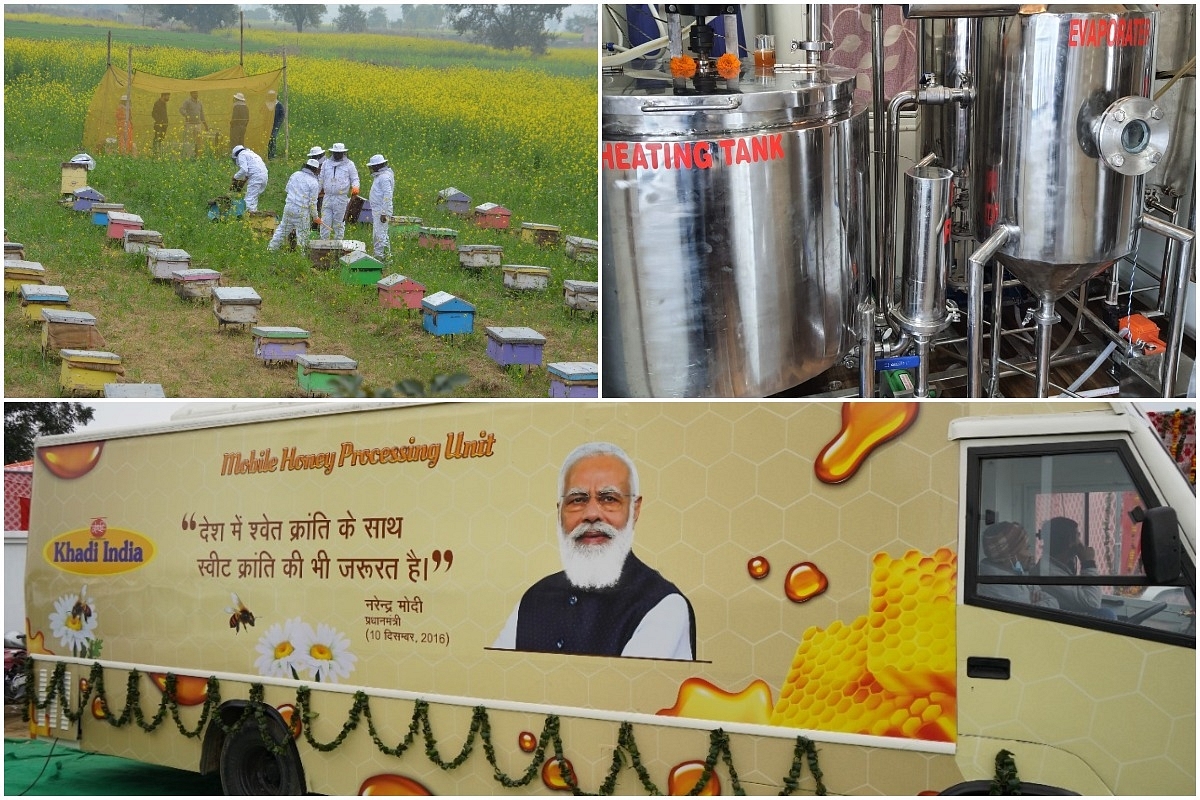News Brief
How The Central Government Is Revolutionising Honey Production For Farmer, Beekeeper Welfare
- The mobile honey processing unit can process up to 300 kg of honey in 8 hours.
- The van is also equipped with a testing laboratory that would instantly examine the quality of honey.

The mobile honey processing vans launched by KVIC.
In a big boost to Prime Minister’s dream of “Sweet Kranti” (Sweet Revolution) though honey production, Khadi and Village Industries Commission (KVIC) has launched the country’s first Mobile Honey Processing Van at the village Sirora at Ghaziabad in Uttar Pradesh.
The mobile honey processing unit can process up to 300 kg of honey in 8 hours. The van is also equipped with a testing laboratory that would instantly examine the quality of honey.
KVIC has come up with this unique innovation to enable beekeepers and farmers to get fair prices for their honey produce.
The Mobile Honey Processing Van comes as a major development under KVIC’s Honey Mission which aims at training beekeepers, distributing Bee Boxes to farmers and helping rural, educated as well as unemployed youth to earn extra income through beekeeping activities.
KVIC has designed the innovative Mobile Honey Processing Van that will process beekeepers’ honey at their doorsteps and thus save them the hassle and the cost of taking the honey to processing plants in far off cities for processing.
While this will make beekeeping a more profitable business for small beekeepers, this will also maintain purity and highest quality standards of honey.
Addressing a gathering on the occasion, KVIC Chairman Vinai Kumar Saxena said the Honey Mission aims at increasing the honey production in the country and adding to the income of farmers and beekeepers.
Local MLA Nand Kishore Gujjar and KVIC Member (Central Zone), Jai Prakash Gupta were present on the occasion. The Mobile Van has been designed in-house by KVIC at its Multi-disciplinary Training Centre, Panjokehra, at a cost of Rs 15 lakh.
Saxena said this innovative Mobile Honey Processing Van will serve multiple objectives. Besides reducing the honey extraction and processing cost to the beekeepers, it will also eliminate any scope for adulteration of honey as the processing will be done at the doorsteps of the beekeepers and farmers.
The honey processing unit will prove to be a boon for small beekeepers and farmers who are incurring extra cost for bringing their honey to other cities for processing and packaging.
He added that based on the experience of the pilot project, more such mobile honey processing units, particularly in the Northeastern states, will be rolled out.
It is noteworthy that transportation of honey to processing plants is an expensive affair for small farmers and beekeepers. To avoid high transportation and processing cost, a majority of beekeepers would sell their raw honey to the agents at their farms itself at a very low price.
As a result, these beekeepers were not able to fetch the actual monetary benefits of beekeeping. This Mobile Honey Processing Van is likely to benefit the beekeepers in rural areas of states like Uttar Pradesh, Uttarakhand, Haryana, Delhi, Punjab and Rajasthan.
The honey processing van will move to different apiaries in these states where beekeepers will be able to get their honey processed at nominal charges that too at their doorsteps.
The honey processing unit also comprises a laboratory technician and a technical assistant to look after the honey testing.
It may be noted that under Honey Mission, KVIC has so far distributed nearly 1.60 lakh bee boxes across the country and created over 40,000 employment opportunities.
In the Western Uttar Pradesh region alone, which has an abundance of flora, KVIC has distributed nearly 8,000 bee boxes to farmers and beekeepers, which has multiplied their income and increased the crop yield through cross-pollination.
Support Swarajya's 50 Ground Reports Project & Sponsor A Story
Every general election Swarajya does a 50 ground reports project.
Aimed only at serious readers and those who appreciate the nuances of political undercurrents, the project provides a sense of India's electoral landscape. As you know, these reports are produced after considerable investment of travel, time and effort on the ground.
This time too we've kicked off the project in style and have covered over 30 constituencies already. If you're someone who appreciates such work and have enjoyed our coverage please consider sponsoring a ground report for just Rs 2999 to Rs 19,999 - it goes a long way in helping us produce more quality reportage.
You can also back this project by becoming a subscriber for as little as Rs 999 - so do click on this links and choose a plan that suits you and back us.
Click below to contribute.
Latest